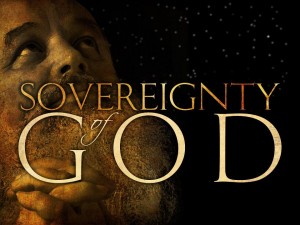 I have met more than one professing Christian who railed against the concept of God’s Sovereignty by saying that the word “Sovereign” is not even found in the Bible. Have you ever heard such a thing? In reality, the whole argument is quite laughable for the simple reason that while the word ‘Sovereign’ is not found in the King James Version of the Bible (you will not find the word “Trinity” in there either), others translations of the Bible do indeed use the word “Sovereign” quite frequently. It should also be said that one of the Hebrew names of God is ‘El Elyon’ which means “the Most High God” or “the Sovereign One.”
I have met more than one professing Christian who railed against the concept of God’s Sovereignty by saying that the word “Sovereign” is not even found in the Bible. Have you ever heard such a thing? In reality, the whole argument is quite laughable for the simple reason that while the word ‘Sovereign’ is not found in the King James Version of the Bible (you will not find the word “Trinity” in there either), others translations of the Bible do indeed use the word “Sovereign” quite frequently. It should also be said that one of the Hebrew names of God is ‘El Elyon’ which means “the Most High God” or “the Sovereign One.”
The whole Bible is a revelation of God in His supreme sovereignty. By Sovereignty we mean that God does what He wants, when He wants, the way He wants, without having to ask anyone’s permission.
God “works all things according to the counsel of His will” – Ephesians 1:11.
Psalm 115:3 states it this way, “Our God is in heaven; He does whatever pleases Him.”
Psalm 135:6 says, “The LORD does whatever pleases Him, in the heavens and on the earth, in the seas and all their depths.” God is sovereign. He is in control.
If I was asked to show God’s Sovereignty by quoting only one verse of the Bible, I would probably turn to Romans 11:36. In Romans 8:28 through to the end of chapter 11, Paul has outlined the supremacy, majesty and sovereignty of God in unmistakable terms. And yet Paul is not merely a theologian of the mind, but one of the heart also and therefore under the inspiration of the Holy Spirit, his high theology becomes worshipful doxology, as he thunders out the heartfelt cry of “oh…” – and what a massive “oh” it is!
Romans 11:33 Oh, the depth of the riches and wisdom and knowledge of God! How unsearchable are his judgments and how inscrutable his ways!
34 “For who has known the mind of the Lord,
or who has been his counselor?”
35 “Or who has given a gift to him
that he might be repaid?”
36 For from him and through him and to him are all things. To him be glory forever. Amen.
Everything is from Him.
Behind all the schemes and actions of mice and men stands Yahweh, sovereign and majestic in regal splendor. All things are from Him. He is the Source of all things. All things come from Him.
As the Westminster Confession of Faith states, “God from all eternity, did, by the most wise and holy counsel of His own will, freely, and unchangeably ordain whatsoever comes to pass; yet so, as thereby neither is God the author of sin, nor is violence offered to the will of the creatures; nor is the liberty or contingency of second causes taken away, but rather established.”
Much could be written to explain the words of the Confession here but there is absolutely no doubt as to what the text says and as to what it means by what it says. All things are from Him.
Everything is Through Him
Next, we read that all things are “Through Him.” All things exist by His activity and through His sustaining power. Jesus revealed that not even a single sparrow falls to the ground “apart from your Father.” (Matthew 10:29) Even when it comes to seemingly insignificant or trivial events (like a sparrow falling); these events only occur because of the Father’s will.
Everything is to Him
All things are “to Him.” He is the purpose for everything. All things exist for Him. All things are “to Him.” There is no purpose found outside of Him.
All things are FROM HIM. All things are THROUGH HIM. All things are TO HIM.
To Him be the glory!
If even ONE of these statements is NOT altogether true, then we would not be able to say “To him be glory forever. Amen.” If all things are not from Him, then not all the glory is due Him. If all things are not through Him, God is not to be glorified for sustaining everything. And if all things are not to Him, then He is not to be glorified as the purpose for everything. But precisely because all these things are true – from Him and through Him and to Him are all things, then it follows that to Him belongs all the glory forever.
When Paul had written these words of supreme Sovereignty, he closed by adding the word “Amen” which means “this is true” or “so be it.”
May I ask, when you encounter these words, what is the response of your heart and mind? The one who embraces the Bible as God’s word has no other alternative than to bow before this Sovereign Lord and humbly affirm with the Apostle, “Amen – this is true, so be it.”
Romans 11:36: “For from him and through him and to him are all things. To him be glory forever. Amen.”
